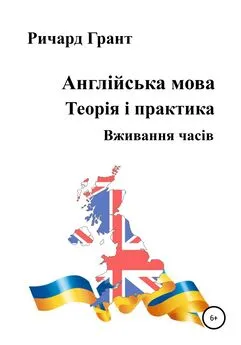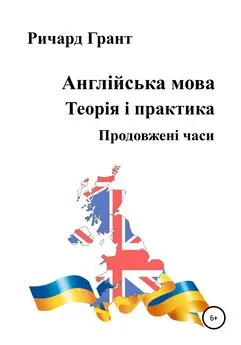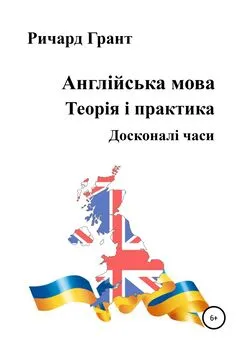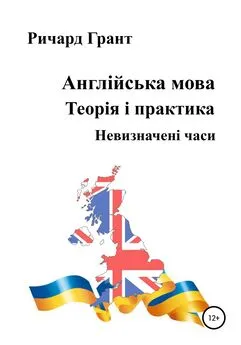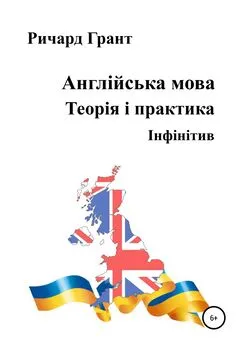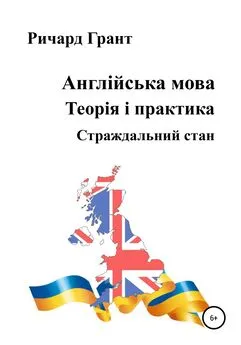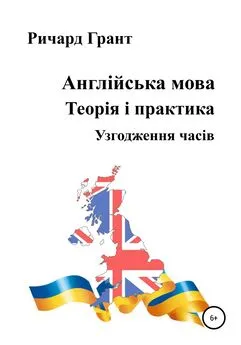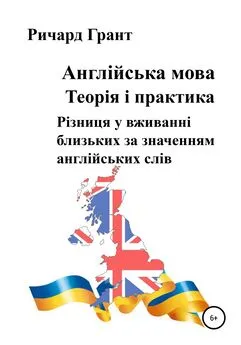Ричард Грант - Англійська мова. Теорія і практика. Вживання часів
- Название:Англійська мова. Теорія і практика. Вживання часів
- Автор:
- Жанр:
- Издательство:неизвестно
- Год:2021
- ISBN:978-5-532-94578-4
- Рейтинг:
- Избранное:Добавить в избранное
-
Отзывы:
-
Ваша оценка:
Ричард Грант - Англійська мова. Теорія і практика. Вживання часів краткое содержание
Освоївши теоретичний матеріал, представлений в цій серії і виконавши більше 600 вправ для самоконтролю, Ваш словниковий запас складатиметься з більше, ніж 6 000 англійських слів і виразів, що дозволить Вам успішно скласти такі міжнародні іспити по англійській мові, як TOEFL(Test of English as a Foreign Language), IELTS(International English Language Testing System) і інші.
Англійська мова. Теорія і практика. Вживання часів - читать онлайн бесплатно ознакомительный отрывок
Интервал:
Закладка:
Вправа 8
Розкрийте дужки, вживаючи дієслова у Present Continuous або у Present Simple.
1. My father ( not to work) on Sunday. 2. When you usually (to come) home from school? – I ( to come) at three o’clock. 3. I ( not to drink) milk now. 4. We ( to have) an English lesson now. 5. I ( not to know) about you, but I ( to go) out to the cinema. 6. Don’t disturb him. He just ( to work) at his English. 7. You ( to work) now? You ( to work) every day? 8. We ( not to dance) every day. 9. He ( to work) every day. 10. Where your cousin ( to work)? – He ( to work) at a hospital. 11. I ( to go) for a walk after dinner. 12. He ( to feel) in a position to lend her money. 13. I ( not to like) to watch TV very often. But at the moment I ( to enjoy) my favourite film Gone with the Wind . And I ( to be) very happy. 14. He ( to play) now? He ( to play) in the afternoon?
Вправа 9
Розкрийте дужки, вживаючи дієслова у Present Continuous або у Present Simple.
1. Look! Kate ( to dance). 2. I ( to read) books in the evening. 3. Your sister ( to study) at college? – No, she ( to go) to school. 4. I ( not to go) to the theatre every Sunday. 5. I ( to think) she ( not to feel) safe there. 6. You ( to have) any idea where Rick ( to be)? I ( not to see) him at work now. – He ( to visit) his friends in Spain. 7. They ( to eat) now? They ( to eat) at school? 8. Kate ( to sing) well? 9. I ( not to read) books in the morning. 10. My cousin ( to go) to school every day. 11. He ( not to work) now. 12. You ( to see) what I ( to mean)? 13. Hurry up! We ( not to have) much time left. – I ( to come)! 14. Your sister ( to rest) now? Your sister ( to rest) after school?
Вправа 10
Розкрийте дужки, вживаючи дієслова у Present Continuous або у Present Simple.
1. Where he ( to go) in the morning? 2. I ( to write) an exercise now. 3. My mother ( not to play) the piano now. She ( to play) the piano in the morning. 4. He ( to play) now. 5. You ( to hear) what she ( to say)? 6. She ( to try) to lose weight, I ( to think). She always ( to have) light lunches. 7. What you ( to do) now? What you ( to do) every morning? 8. He ( not to sleep) after dinner. 9. I ( not to write) a letter now. 10. When you ( to listen) to the news on the radio? 11. He ( to play) now? 12. He ( not to feel) at liberty to tell you the truth. 13. She ( to try) to do her best. 14. What you ( to read) now? What you ( to read) after dinner?
Вправа 11
Розкрийте дужки, вживаючи дієслова у Present Continuous або у Present Simple.
1. My granny ( to sleep) after dinner. 2. They ( to play) in the yard now. 3. Who ( to make) breakfast for you now? 4. My mother ( to work) in a factory. 5. Ron has got a new job. He ( to earn) a fortune as a managing director. They ( to think) he ( to be) a bag of money. 6. My little brother ( not to play) the piano very well. That ( to be) why he ( to practise) the piano again. 7. What they ( to eat) now? What they ( to eat) for breakfast? 8. When you ( to sleep)? 9. They ( not to play) in the street now. 10. You ( to read) a magazine and ( to think) about your holiday at the moment? 11. My aunt ( not to work) in a shop. 12. They ( to come) tonight? – Yes, I ( to believe) so. 13. My grandmother ( to be) busy. She ( to bake) an apricot pie. She ( to bake) pies every Sunday. 14. What your brother ( to drink) now? What your brother ( to drink) in the evening?
Вправа 12
Розкрийте дужки, вживаючи дієслова у Present Continuous або у Present Simple.
1. Nina ( not to sleep) now. 2. They ( to play) in the room now? 3. They ( to be) good dancers but they ( not to go) to discos very often. 4. You ( to work) in an office? 5. I ( to believe) in myself at the moment. 6. I ( to be) sad. That ( to be) why I ( to cry). 7. Everybody ( to have) a good time now? Everybody ( to have) a good time every Saturday? 8. Where John ( to live)? – He ( to live) in England. 9. He ( to help) his mother every day. 10. What she ( to talk) about right now? 11. Your father ( to work) in this factory? 12. He ( to dislike) walking, he ( to like) jogging. 13. She ( to take) medicine now? How often she ( to take) medicine? 14. My friends from Switzerland ( to speak four languages. 15. Who ( to listen) to music on his personal stereo over there right now?
Вправа 13
Розкрийте дужки, вживаючи дієслова у Present Continuous або у Present Simple.
1. He ( to help) his mother every day? 2. You ( to play) chess now? 3. Where they ( to go) now? Where they ( to go) on Sunday? 4. Elvire ( to speak) English, German and French? – Yes, she …. 5. He ( not to help) his mother every day. 6. Look at the sky: the clouds ( to move) slowly, the sun ( to appear) from behind the clouds, it ( to get) warmer. 7. They ( to speak) English now? What language they usually ( to speak)? 8. She only ( not to speak) Italian. 9. You ( to go) to school on Sunday? 10. How is your brother? – He is not well yet, but his health ( to improve) day after day. 11. She ( to work) in a shop now? 12. Listen! Who ( to play) the piano in the next room? 13. He ( to deliver) furniture now? 14. Henry usually ( to wear) glasses and now he ( to wear) sunglasses. 15. You ( to go) to the opera with your friends? Who ( to be) your favourite opera singer?
Вправа 14
Розкрийте дужки, вживаючи дієслова у Present Continuous або у Present Simple.
One Sunday Agnes and her mother went to the zoo. The girl was very excited. She was interested in everything she saw. “Mother, look,” she said. “There ( to be) a monkey in this cage. It ( to eat) an apple. Now it ( to give) a bite to another monkey. I ( to think) monkeys ( to like) apples very much.” “Yes, dear,” said her mother. “Now I ( to want) to go and see the lions and tigers. Where they ( to live), mother?” “In that big house over there. Come along.” Agnes enjoyed the lion’s house a lot. “Mother,” she said, “the tiger ( to want) a drink: it ( to go) to the dish of water there in the corner. And the lion ( to look) right at me. You ( to think) it ( to want) to eat me up? When the lions and tigers ( to have) their dinner, mother?” “The keepers ( to bring) them large pieces of meat every day at four o’clock. And they ( to make) a lot of noise before their dinner time, so everybody ( to know) they ( to be) hungry.”
Рiзниця мiж The Past Simple i The Past Continuous
1. Past Continuous використовується для опису процесу в певний момент в минулому, а Past Simple – для опису закінченої дії в минулому.
When I looked out of the window, I saw that a stranger was walking in our street. – Коли я виглянув з вікна, я побачив, що незнайомець прогулювався по нашій вулиці. (процес у певний момент у минулому)
Did you see a stranger who walked in our street? – Ти бачив незнайомця, який пройшов по нашій вулиці? (закінчена дія)
2. Past Continuous, на відміну від Past Simple, не використовується з дієсловами стану ( stative verbs).
I was knowing knew him for several years. – Я знав його кілька років.
Зверніть увагу на наступні речення:
Читать дальшеИнтервал:
Закладка:
